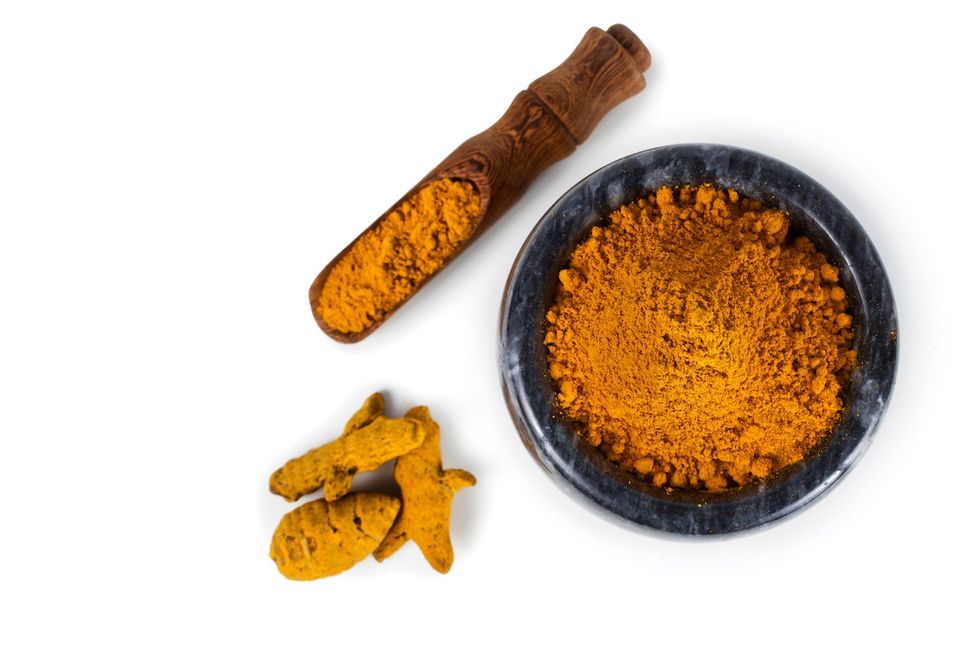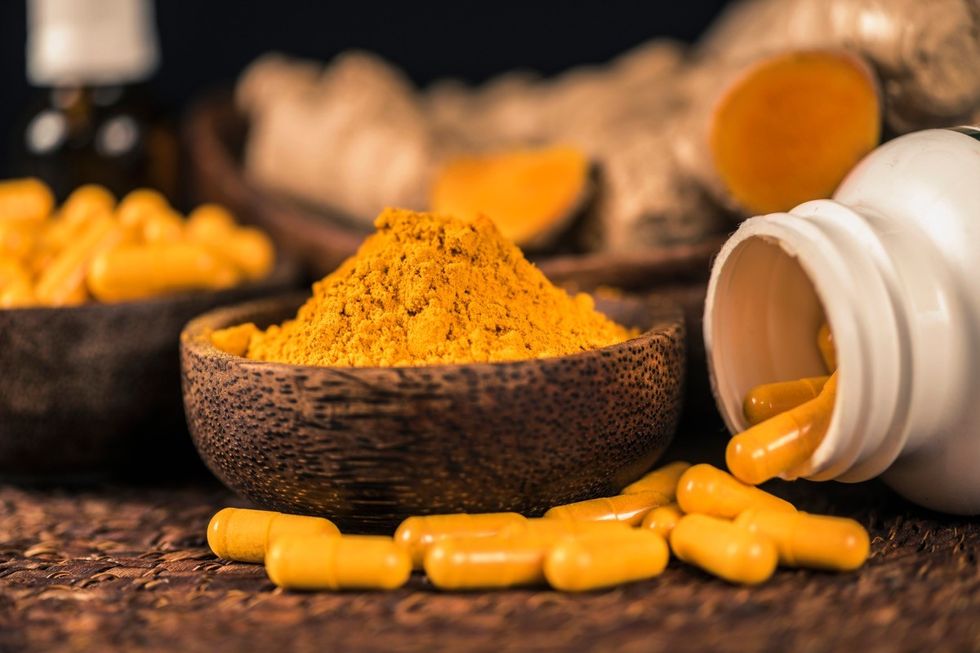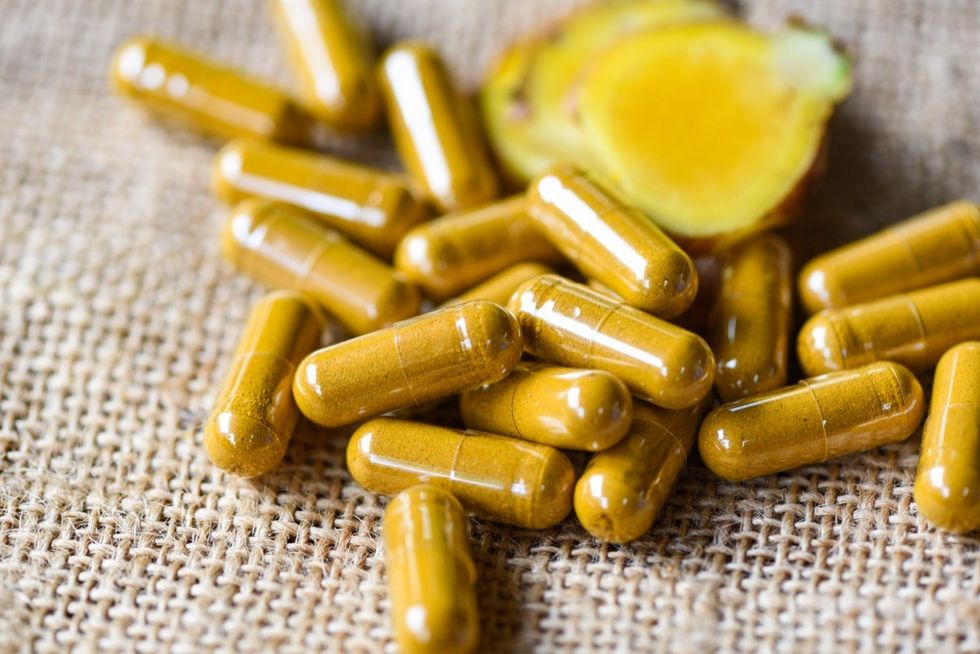
Turmeric isn't just a golden spice for curries—it's a powerhouse of health benefits available in supplement form that's been used for for over 4,000 years in Ayurvedic and traditional medicine. Today, science is backing what ancient healers have long believed: taking turmeric daily can support everything from your brain function to joint health, weight management, and more. Thanks to its active compound, curcumin, this plant in the ginger family is packed with anti-inflammatory, antioxidant, and disease-fighting properties.
Almost 20 percent of American supplement users over the age of 55 now take a turmeric or curcumin supplement, the 2018 CRN Consumer Survey on Dietary Supplements found. And research suggests turmeric lives up to its hype. Studies show that curcumin can help reduce chronic inflammation—a major contributor to conditions like heart disease, arthritis, and even cognitive decline. Plus, it can help with digestion, support your immunity, and even enhance your mood.
The enthusiasm over this wonder supplement isn't expected to die down, either. Valued at $85 million in 2023, the global turmeric market is projected to grow to $205 million by 2032, according to one industry report.
So, should you start taking turmeric supplements every day? In this guide, we break down the surprising science-backed benefits, how to take turmeric for maximum absorption, and what to watch out for—so you can decide if this ancient superfood deserves a spot in your daily routine.
RELATED: 10 Best Supplements for Weight Loss, According to Experts
What is Turmeric?

Turmeric is a spice derived from the root of the Curcuma longa, a flowering plant found natively in South and Southeast Asia. Its most active compound, curcumin, is responsible for its vibrant yellow-orange color.
For thousands of years, turmeric has been used for its medicinal properties and as a flavorful cooking spice in South Asian and Middle Eastern cuisines. It's a key ingredient in key ingredient in curries and golden milk.
In the Western world, turmeric has emerged as one of the most popular dietary supplements on the market. It's touted as providing a range of health benefits for your joints, digestion, immunity, and overall wellness due to its anti-inflammatory and antioxidant effects.
Turmeric vs. Curcumin

Curcumin is the main bioactive ingredient in turmeric. Though turmeric and curcumin supplements are both advertised as being beneficial for your health, some medical experts say that curcumin supplements are far more potent than turmeric supplements and are, therefore, more likely to have a tangible impact.
For instance, the Arthritis Foundation recommends skipping turmeric in favor of high-quality curcumin extract to address rheumatoid arthritis symptoms, noting that curcumin supplements have all the health benefits of turmeric—and then some.
One study analyzed the average curcumin content in high-quality powdered turmeric and found that "pure turmeric powder had the highest curcumin concentration, averaging 3.14 percent by weight."
However, it's important to note that, for some people, a less potent dose may be preferable due to its lower risk of side effects, which can include upset stomach, nausea, and, in severe cases, stomach ulcers.
"As wonderful as turmeric's nutritional benefits can be, more curcumin is not necessarily better, and too much can be risky," notes Johns Hopkins Medicine. For instance, people with gall bladder issues or on blood thinners should consult with their doctor. (See below for more info on those who should avoid turmeric and/or curcumin.)
RELATED: 7 Best Supplements to Boost Your Immune System
Benefits of Turmeric Supplements: 1. Turmeric and curcumin fight inflammation.

Inflammation is a common underlying cause for a range of chronic health conditions. That's the main reason that turmeric and curcumin supplements, which help fight inflammation, may broadly benefit your health.
"Turmeric's most well-known benefit lies in its potent anti-inflammatory properties," says Dev Batra, MD, dual board certified vascular and interventional radiologist at Texas Vascular Institute. "Curcumin, the primary bioactive compound in turmeric, works to combat inflammation at the molecular level. It inhibits the activity of various molecules known to play a role in inflammation, thereby reducing swelling and discomfort."
"By regularly consuming a turmeric supplement, you can help alleviate symptoms associated with conditions like arthritis while also lowering the risk of chronic inflammatory diseases," the doctor adds.
2. They contain powerful antioxidants.

Turmeric's "remarkable" antioxidant properties are another reason to consider supplementation, Batra says.
"Curcumin is a potent scavenger of free radicals, those unstable molecules that can cause oxidative stress and damage to cells," he explains. "By neutralizing these harmful compounds, curcumin is essentially protecting your body from oxidative damage and supporting overall cellular health."
Though more research is needed, this has led some to believe that turmeric has the ability to help prevent or fight cancer, boost the immune system, and more.
"By incorporating a daily turmeric supplement, you're not just boosting your body's natural defense mechanisms, you're potentially reducing the risk of chronic diseases associated with oxidative stress in the long run," Batra says.
RELATED: Cardiac Surgeon Reveals Top 3 Supplements for Heart Health
3. They're good for your cognitive and mental health.

You may also be able to boost your cognitive and mental health by adding turmeric supplements to your regimen, Batra says. Research supports the notion that curcumin may have neuroprotective effects, potentially helping to maintain brain function and protect against age-related cognitive decline.
"Additionally, its ability to modulate neurotransmitters such as serotonin and dopamine may enhance mood and support mental wellness. Integrating a daily turmeric supplement can nurture your mind and body, promoting a holistic approach to health and vitality," Batra notes.
In fact, one recent study conducted by UCLA researchers and published in the American Journal of Geriatric Psychiatry found that turmeric improved both memory and mood in subjects with mild, age-related memory loss. The researchers theorized that these benefits may be due to turmeric's ability to reduce inflammation in the brain, which has been linked to both Alzheimer's disease and mood disorders, including depression.
Another meta-analysis of randomized controlled trials found that curcumin, the active ingredient in turmeric, may increase levels of brain-derived neurotrophic factor (BDNF), a protein that's important to learning, memory, and behavior.
"The significant positive impact of curcumin supplementation on BDNF levels indicates its potential use for neurological disorders that are associated with low BDNF levels," the researchers wrote. These can include psychiatric, neurodegenerative disorders, and age-related decreases in brain function.
4. They may improve certain gastrointestinal conditions.

Taking turmeric may also help to improve certain gastrointestinal conditions, such as indigestion, dyspepsia, and even ulcerative colitis.
One 2020 study published in the journal Annals of Gastroenterology recruited 380 adults with ulcerative colitis to analyze the adjuvant effects of curcumin when combined with mesalamine, a medication commonly used to treat the condition. "Based on our study, combined mesalamine and curcumin therapy was associated with roughly threefold better odds of a clinical response compared to placebo, with minimal side effects," they wrote.
Another study published in June 2024 in the journal BMJ Evidence-Based Medicine suggests that curcumin may be as effective as omeprazole (a common acid-reducing drug) for treating indigestion. Researchers in Thailand conducted a randomized trial with 206 patients suffering from functional dyspepsia (chronic indigestion) and observed significant improvements in indigestion symptoms, with reductions in pain and discomfort.
However, satisfaction levels remained lower among curcumin users, possibly due to its taste or smell. Importantly, no serious side effects were reported, although mild liver function changes were observed in overweight participants taking curcumin.
It's important to consult with your doctor before taking turmeric for stomach problems. Turmeric can have adverse effects on individuals with GERD, gallstones, or ulcers.
5. They can benefit your heart health.

Thanks to their anti-inflammatory and antioxidant properties, turmeric and curcumin may also benefit your heart health, preliminary research suggests. However, it's important to note that more research is needed—there is no conclusive evidence that turmeric supplements can stave off heart disease in humans.
"Early studies suggested that turmeric may help prevent atherosclerosis, the buildup of plaque that can block arteries and lead to heart attack or stroke," says Mount Sinai. "In animal studies, an extract of turmeric lowered cholesterol levels and kept LDL (bad) cholesterol from building up in blood vessels. Because it stops platelets from clumping together, turmeric may also prevent blood clots from building up along the walls of arteries."
RELATED: 5 Supplements That Can Damage Your Kidneys, Doctors Say.
6. They can help your muscles recover post-workout.

A new review published December 2024 in the Journal of the International Society of Sports Nutrition suggests that a daily intake of 1-4 grams of curcumin may help speed up muscle recovery and reduce pain after exercising.
"Curcumin could greatly enhance the well-being of those who engage in regular physical training," the study concluded. "It may even play a significant role in reducing inflammation biomarkers and improving antioxidant capacity, among other health benefits."
The study's lead author, Daniel Vasile Popescu-Radu, explained: "Both pre- and post-exercise curcumin consumption are associated with better outcomes in terms of muscle recovery, reduced pain, and improved antioxidant capacity.”
That said, factors like dosage, bioavailability, and hormonal influences in women may affect curcumin's efficacy in post-workout recovery. Popescu-Radu and his study co-authors emphasized that while curcumin shows promise as a natural recovery aid, more research in this area needs to be done to fully understand its impact.
7. They can help you lose weight.

A meta-analysis of randomized controlled trials published in May 2023 found that turmeric and curcumin can help with weight loss.
More specifically, the researchers concluded that curcumin supplementation significantly reduced body mass index (BMI), body weight, and waist circumference, especially in adults with obesity and diabetes.
"Curcumin extract and bioavailability-enhanced formulas seem to be the most effective formulas for weight reduction," the study concluded.
RELATED: 6 Best Walking Workouts for Weight Loss
Who Should Stay Away From Turmeric?

Despite its many benefits, turmeric or curcumin supplements aren't for everyone. Some people are at increased risk of experiencing side effects.
"Turmeric supplements should be avoided by several groups, including those with bleeding disorders, those taking blood thinners, and those with liver or bile duct problems," says Raj Dasgupta, MD, chief medical advisor for Fortune Recommends Health. "Pregnant or breastfeeding women and people with stomach ulcers, GERD, hormone-sensitive conditions, or arrhythmias should also steer clear."
Additionally, if you take medication for diabetes, speak to your doctor before taking turmeric since it can cause low blood sugar.
You should also not take turmeric if you are preparing for surgery since the supplement can act as a blood thinner. It's important to let your doctor and surgeon know if you have been taking turmeric prior to a procedure.
When in doubt, always consult your healthcare provider for expert guidance. They can help you determine whether or not your specific set of health concerns, medications, and supplements are compatible with turmeric or curcumin.
What's the Best Way to Take Turmeric?

There are many different ways to take turmeric or curcumin, including eating it in your diet, drinking turmeric tea, taking turmeric extract or tinctures, or taking a dietary supplement in the form of a pill, capsule, or gummy.
Stewart Parnacott, CRNA, a nurse anesthetist and nurse practitioner working with Ready Weight Loss & Wellness, says the best way to consume turmeric or curcumin is from whole foods. "Turmeric is best absorbed when combined with black pepper or taken with food. Foods that contain healthy fats, like olive oil or coconut oil, are optimal companions for turmeric because these foods contain lecithin, a compound that makes turmeric more easily absorbed in the body."
Studies have shown that black pepper increases curcumin absorption and bioavailability by up to 2000%, Johns Hopkins Medicine says.
Whether or not it's safe to take a turmeric supplement every day depends on the form and individual health. "Turmeric is a naturally occurring ingredient and is widely considered safe to take regularly, especially at doses around 500 mg," Dasgupta says.
However, he notes that, for best results, "it's important for consumers to look for products that list the actual amount of turmeric in their supplements. High doses of turmeric are not recommended due to the risk of side effects."
To get personalized recommendations, consult with your doctor.











 Занепокоєння і безсоння – це взаємопов’язані частини єдиного циклу, потрапляючи в який організм не може нормально відпочивати, вважає психолог зі сну Кетрін Холл. Способи позбавитися нав’язливих думок ночами і добре висипатися вона назвала в розмові. Психолог пояснила, що причина виникнення занепокоєння полягає в страху провести чергову ніч без сну і вранці почуватися розбитим. При цьому, […]
Занепокоєння і безсоння – це взаємопов’язані частини єдиного циклу, потрапляючи в який організм не може нормально відпочивати, вважає психолог зі сну Кетрін Холл. Способи позбавитися нав’язливих думок ночами і добре висипатися вона назвала в розмові. Психолог пояснила, що причина виникнення занепокоєння полягає в страху провести чергову ніч без сну і вранці почуватися розбитим. При цьому, […]











 Переважно всі знають про маринований перець. А от із квашеним мало хто знайомий. Для приготування можна брати будь-які плоди: морожені, гарні стиглі та свіжі, навіть в’ялі. Спробуйте приготувати з них нову для себе консервацію. Інгредієнти Для приготування потрібні наступні продукти: солодкий перець; вода — 800 мл; цукор — 3 скл.; оцет — 0,5 л; сіль […]
Переважно всі знають про маринований перець. А от із квашеним мало хто знайомий. Для приготування можна брати будь-які плоди: морожені, гарні стиглі та свіжі, навіть в’ялі. Спробуйте приготувати з них нову для себе консервацію. Інгредієнти Для приготування потрібні наступні продукти: солодкий перець; вода — 800 мл; цукор — 3 скл.; оцет — 0,5 л; сіль […] Компанія Suzuki зупинила продажі п’ятидверних Jimny через шалений попит, який перевищує виробничі можливості. Про поновлення продажів пообіцяли розповісти додатково. Усього за чотири дні подовжений позашляховик зібрав 50 тисяч попередніх замовлень, хоча Suzuki розраховувала щомісяця продавати 1200 таких машин. Неважко підрахувати, що без перегляду планів заявки виконуватимуть три з половиною роки! Просто збільшити виробництво теж навряд […]
Компанія Suzuki зупинила продажі п’ятидверних Jimny через шалений попит, який перевищує виробничі можливості. Про поновлення продажів пообіцяли розповісти додатково. Усього за чотири дні подовжений позашляховик зібрав 50 тисяч попередніх замовлень, хоча Suzuki розраховувала щомісяця продавати 1200 таких машин. Неважко підрахувати, що без перегляду планів заявки виконуватимуть три з половиною роки! Просто збільшити виробництво теж навряд […] Дослідники виявили, що доколумбова цивілізація Касарабе в Амазонії розробила унікальну систему управління водними ресурсами, яка дозволяла їм вирощувати кукурудзу протягом усього року, змінюючи уявлення про стародавнє землеробство в регіоні. Фото Умберто Ломбардо в полі. Авторство зображення: Серхіо Кезада Відкриття, опубліковане в Nature, демонструє, що жителі Льянос-де-Моксос (сучасна Болівія) створили складну агротехнічну систему, яка включала дренажні […]
Дослідники виявили, що доколумбова цивілізація Касарабе в Амазонії розробила унікальну систему управління водними ресурсами, яка дозволяла їм вирощувати кукурудзу протягом усього року, змінюючи уявлення про стародавнє землеробство в регіоні. Фото Умберто Ломбардо в полі. Авторство зображення: Серхіо Кезада Відкриття, опубліковане в Nature, демонструє, що жителі Льянос-де-Моксос (сучасна Болівія) створили складну агротехнічну систему, яка включала дренажні […] 5 Продюсерка Олена Мозгова похвалилася оновленою зачіскою та поміркувала про своє 51-річчя, яке святкуватиме 9 лютого. У своєму Instagram продюсерка показалася з чорним кольором волосся. «І знову брюнетка. Червоний манікюр, знайшлась і помада червона. Все по фен-шую, коротко кажучи», — написала вона. Незабаром продюсерка буде відзначати 51-річчя Також Мозгова зауважила, що зараз почувається дуже комфортно […]
5 Продюсерка Олена Мозгова похвалилася оновленою зачіскою та поміркувала про своє 51-річчя, яке святкуватиме 9 лютого. У своєму Instagram продюсерка показалася з чорним кольором волосся. «І знову брюнетка. Червоний манікюр, знайшлась і помада червона. Все по фен-шую, коротко кажучи», — написала вона. Незабаром продюсерка буде відзначати 51-річчя Також Мозгова зауважила, що зараз почувається дуже комфортно […]